 |
| Flute
instruments are made sounds by the air vibration inside the
main body. The current improved flutes with different kind of
materials not being limited in wooden ones can be categorized
to be 3 sections depending on the numbers of vibrators:
|
| |
| Non-Reeds Wood wind
instruments: |
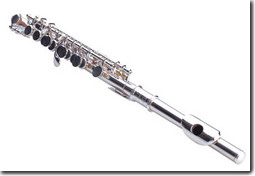
|
Piccolo:
The piccolo is half the size
of the flute; those two instruments have their same playing
way. The notes sound of piccolo is an octaves higher;
it is one of the highest and most penetrating instruments
of the orchestra. Especially, it is effective in highlighting
orchestral tutti and strengthening the upper partials
of the harmony.
Listen to the music of Piccolo:
Vivaldi: Concerto for Piccolo
& Strings in a minor RV445 2nd movement-Larghetto |
|
 |
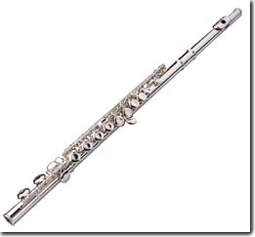
|
FLUTE:
Flute is an elegant instrument;
metal material has been replacing with the wooden one
which is hard to be seen at current time. The main body
of flute is with silver-white color and whole set can
be divided into 3 parts: Mouthpiece、body
and Bell. The music player should hold it horizontally;
through the blowing wind into the body, it is able to
vibrate to make sounds brighter and more penetrating without
the help of any reeds. In addition to the control of breathing,
you are able to make use of the tongue playing and overtone
to vary timbre.
The
gamut is around three octaves. Besides the Flute, there
also includes Piccolo Alto Flute and Bass Flute in the
family. The structure of Piccolo is similar to the Flute;
but the pronunciation tube is shorter/thinner than the
latter one. The notes sound of Flute is an octaves higher.
The skills to play for these two items are identical;
by the way, flute is in treble clef.
characteristics
descriptions:
Flute and Clarinet are
belonged to treble musical instruments; its timbre of
Flute is pure and simple which let it plays a role as
a theme or solo in the wind band. The notes sound could
be tender and slow likely the water running; it is suitable
for solo when strengthens the upper partials of the
harmony with cheery sound as crowded birds singing.
Listen
to the music of Flute:
Saint-Saens: Carnival
of the Animals-Aviar |
|
 |
| Transposing instrument: |
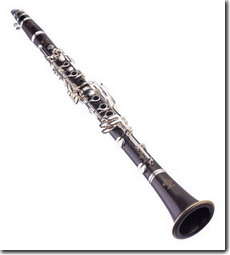 |
CLARINET:
The single cane reed is bound
to the open side of the mouthpiece by means of a metal
ligature with thumbscrews. Whenever the wind blows into
the cane body; it then vibrates the barrels. It is the
only one instrument with closed cane body with vibration
to make sounds. The most common used is the clarinet in
bB; others like A and Alto Clarinet and Bass Clarinet.
The tone quality of the clarinet is widely varied and
its tension is rich and expressive which is treated as
violin in the Wood wind instruments.
characteristics
descriptions:
Clarinet is a Wood wind
instrument with widely varied tone quality.
Its
lowest notes are dark and reedy; you are easily to enjoy
its harmony to get released. While the middle notes
are called “loud and clear area”; that is the source
of its name. Among it, its sound makes you lighthearted.
Finally, its upper notes are rich and expressive which
is touchable to your mind. For example, Mozart has been
written a lot of songs for clarinet that is because
of his love to the unique fascinating notes.
Listen
to the music of Clarinet:
Weber:
Clarinet Concerto No.1 in F minor OP73(J-114) 2nd
movement. |
|
 |
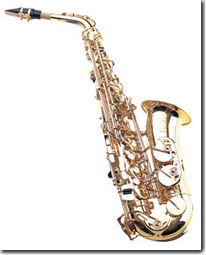
|
SAXOPHONE:
The Saxophones are made by
metal one; the body inside is a cone and enlarging the
Bell as a horn to be upper. Due to evolving from the Bass
clarinet, so it is categorized into the wood wind instrument
field. The structures can be as 3 parts of: mouthpiece,
Bell and Body and there are seven sizes for it. The most
common used are bB and bE. The tone quality is thicker
and inactive which is between the Wood Wind and Brass
Instruments. While the notes sound of Saxophone is around
two octaves half which is generally to be applied to military
brass band and Modern Jazz Music. Usually, it is in treble
clef.
characteristics descriptions:
It is made by metal and
categorized into Wood wind instrument. There are four
different kinds of Saxophones in this family as shown
of “Saprano” 、“Alto”、”Tenor”
and “Baritone”. Because of the lazy and unique features,
so there are a mass to be applied in Jazz music.
Listen
to the music of Saxophone:
Mussorgsky:
Picture At an Exhibition: The Old Castle. |
|
 |
| Double Reeds Wood Wind
Instruments: |
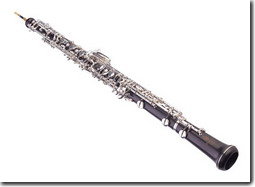
|
OBOE:
Wooden made OBOE is around
seventy centimeter in length; it is similar to the Clarinet
on Cone outlook. There are total three parts consists
of it: they are upper half tube, latter half tube and
Bell. With double Reeds connected into the body, the music
player should study how to control the breath in efficiency;
so it is the most difficult instrument to play in varying
the tone sounds. Its gamut is three octaves; luxury sound
is one of its features. Though not as the same relaxed
as flute; the sweet but sharp tones make it likely the
nasal sounds to own the countryside characters. The family
also includes Oboe da Caccia、Oboe
d’ Amore、Cor
Anglais, it is in treble clef.
characteristics descriptions:
It has similar outlook
with Clarinet; the most difference is the double reeds
OBOE has. Its distinguishing places are sharp and detailed
tones which are likely the nasal sounds. In the “Peter
and the Wolf” of Prokofie music, OBOE was applied to
show as the dry tones of Ducks.
Listen
to the music of OBOE:
Prokofie:
Peter & the Wolf – The Duck |
|
 |
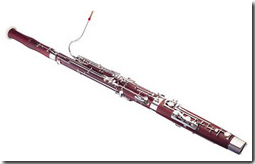
|
BASSOON:
The Bassoon is the bass of
the double-reed woodwind family; the body is two meter
sixty in length. Because it consists of two pieces, so
the length totally is only one meter and forty. The musicians
have to hang it on their necks to play; the way to blow
is likely to the OBOE but the tone sound is muck darker.
So somebody calls this as the violoncello of Wood Wind
Instruments; also it wines a name of “the clown of symphonic
music” with its humorous tones. General speaking, it is
in bass、
inferior Alto clef normally but seldom in treble clef.
Normally is in Concert Pitch. Among the bass instrument
family, there also includes Double Bassoon which is the
same as Bassoon in clef but the Concert Pitch is an octaves
lower than a clef. It is better to use it as a bass instrument
in a ensemble rather than in a solo.
characteristics descriptions:
The musicians should hang
it on their necks to play; it is because of its larger
size. The tone sound is muck darker; so somebody calls
this as the violoncello of Wood Wind Instruments. As
the same as cello, it is unsuitable to perform in solo.
Listen
to the music of Bassoon:
Prokofiev:
Peter & the Wolf: Grandfather |
|
 |
| Data source from:
ComeMusic:Music
Office |